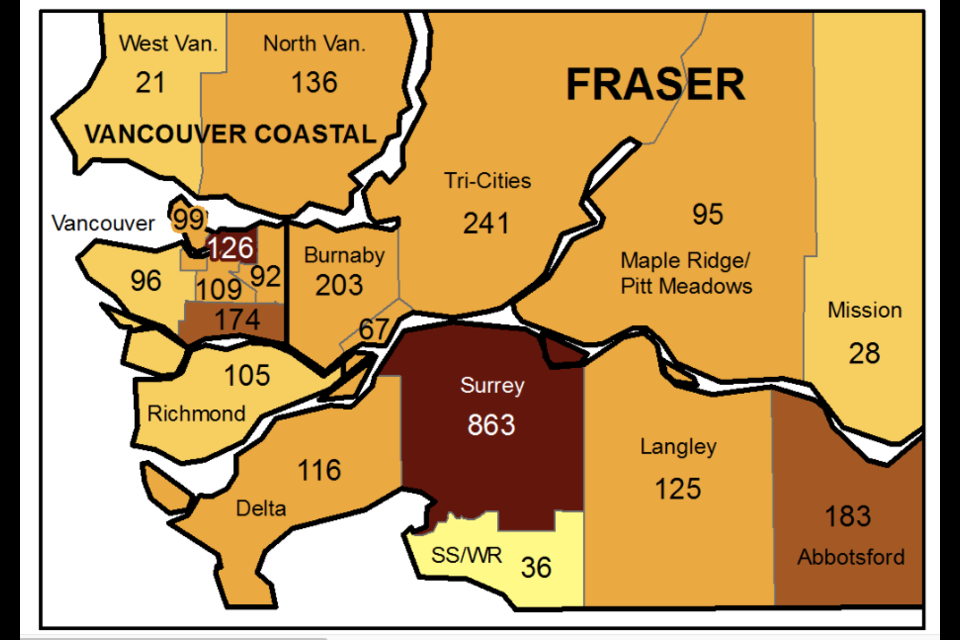The number of new COVID cases on the North Shore has risen again, creeping back to the highest level it’s been since the province began providing that information in December.
There were 157 new cases of coronavirus in the week ending March 6, according to information released by the B.C. Centre for Disease Control, compared to 124 cases the previous week.
The number is similar to the 151 weekly cases reported on the North Shore three weeks ago, during the most recent uptick in community cases.
Of the new cases reported in the past week, 136 cases were in North Vancouver and 21 cases were in West Vancouver.
That puts the rate of new infections in West Vancouver at between five and 10 daily cases per 100,000 people. In North Vancouver, the infection rate is between 10 and 15 daily cases per 100,000.
Those rates of infection are similar to other communities in the Lower Mainland where cases have remained high but stable during the past month.
Whistler cases level off
COVID infections in Whistler, which spiked in January and the first part of February have levelled off.
Whistler reported 32 cases for the week ended March 6 – similar to the week before. There have been over 700 cases of coronavirus in Whistler since Jan. 1, mostly in young adults.
Numbers of COVID cases continue to be low in other parts of the North Shore-Coast Garibaldi health region. On the Sunshine Coast, six cases were reported and in Powell River there were no cases in the week ending March 6.
Surrey remains a hot spot in the Lower Mainland, with cases significantly up over the past month and 863 cases reported in the past week.
Positivity rates for COVID-19 tests are now hovering between six and seven per cent in the Vancouver Coastal Health region, which includes the North Shore, and have been creeping up since the end of January.
On Thursday, Dr. Bonnie Henry, the province’s medical health officer, said the virus is being spread by adults aged 19-39 and by those aged 40 to 59.
Virus being spread by small social gatherings
COVID is primarily being spread by small social gatherings, such as indoor birthday parties, she said. It is also being spread among colleagues in workplaces, including grocery stores, warehouses and sorting plants.
On Friday, Real Canadian Superstore in North Vancouver reported that multiple employees have tested positive for COVID-19.
On Thursday, Henry announced that gatherings of up to 10 people will now be allowed in B.C., outdoors only. Other restrictions remain in place.
“This is slowly turning the dial. It’s not flicking the switch,” said Henry.
From the beginning of the pandemic to the end of February there were 2,487 cases of COVID on the North Shore, including 1,792 cases in North Vancouver and 695 cases in West Vancouver. That puts the cumulative rate of COVID on the North Shore at between 1,000 and 1,500 total cases per 100,000.
COVID was B.C.'s 8th leading cause of death in 2020
Henry presented information Thursday showing COVID was the eighth leading cause of death in B.C. in 2020. “It tells us that this has had a profound effect on our population,” she said.
B.C. has still fared well compared to other parts of Canada and the U.S., she said.
In the United States, COVID was the third leading cause of death in 2020, said Henry, and resulted in a 15 per cent increase in expected mortality. “That is the largest increase that they have had since the 1918 influenza pandemic,” she said.
In Canada, there was a five per cent increase in mortality in 2020 “that translates to about 14,000 extra deaths in the country,” said Henry. Many of those were COVID deaths that occurred in Ontario and Quebec, she said.
'Common suffering builds strong bonds'
“We have a saying that common suffering builds strong bonds. And I think all of us can relate to that over this past year,” said Henry, becoming emotional on Thursday. “I certainly recognize and acknowledge that we've all experienced losses this past year. Some of them are an accumulation of tiny losses of those joys, those things that we had in our lives. And for some people, it's a tragic loss of a loved one, whether from COVID or whether from other things in this uncertain time. This unrelenting uncertainty that we have all been through together takes its toll.”
B.C. had recorded a total of 86,219 cases of coronavirus as of Thursday, with 4,912 active cases. In the Vancouver Coastal Health region, there were 1,334 active cases.



